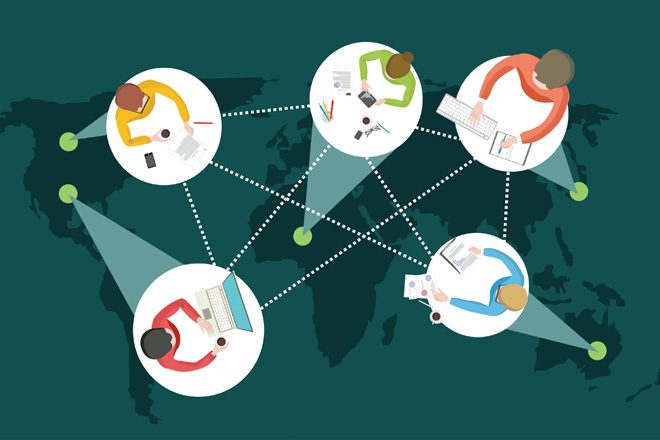Firstly, I sincerely wish good health to all ERP Today readers and their families in these challenging times.
As we consider what a post COVID-19 world might look like, we should never lose sight that this changing world presents new opportunities for those brave enough to seek them out and pursue them. I believe we cannot let the uncertainty of today rule us and we cannot wait for things to go back to the way they were before, for it is likely that those days may never return in the way we might expect them to. Instead, businesses and their leaders will have to embrace the certainty of uncertainty because paradoxically it is the most certain thing we have right now. Businesses must lean into the future rather than hold themselves to the past and in doing so consider their place in the new normal that we can only imagine at this time.
The businesses that are able to survive and thrive during these times are likely to become the high-performing organisations of the future
In previous editions of ERP Today, I have written articles titled ‘Overcoming the fear of Decentralisation’ and ‘Best Network Wins’. The messaging of these articles has never been more important for businesses to consider, because whether prepared to accept it or not, we have all now been thrust into a world that is completely online and has required us to adopt decentralised ways of working. Indeed, these new and increasingly decentralised ways of working are likely to become the way businesses decide to continue long after lockdown and this is particularly true of businesses, which together with their employees will have been able to prove to themselves, their investors and their customers alike that they are capable of operating under such conditions.
The businesses that are able to survive and thrive during these times are likely to become the high-performing organisations of the future with reimagined business models that MBA students will study in years to come. It will become important for businesses to keep elements of these new decentralised business models in place; not least to satisfy the likely updates to ISO disaster-recovery standards that will force organisations to be prepared for similar eventualities in the future.
The thought of future pandemics might be concerning enough, given the fact that many of us are still trying to come to terms with the current situation. However, we should be mindful that if humanity continues with its destructive abuse of the natural environment then it will only serve to increase the recurrence of future epidemics and pandemics. Since HIV in the 1980s we’ve seen an acceleration of life-threatening viruses becoming more common; SARS (2003), H1N1 (2009), MERS (2011) and Ebola (2014-16) all arrived before the COVID-19 crisis of today (2019-present). It should serve as a warning to all that if we do not change our habits then these economically destructive events are likely to become a part of the new normal we’re moving towards. This is why the new normal will require all businesses to take serious action towards their Environmental Social and Governance (ESG) performance.
To be effective in the pursuit of ESG targets, businesses will have to make drastic changes to survive and it is likely that these changes will be enforced and accelerated by new regulations and government policy. However, high-performing businesses will already be taking action, recognising that we are approaching a new normal that will inextricably link ESG performance to revenue performance like never before.
The high-performing companies of the new normal will be those who are able to out perform across all three of their ESG targets
Until now, it could be suggested that many large businesses may have seen ESG targets more as a PR opportunity or a box ticking exercise that appeals to the shifting concerns of employees, investors and consumers. With many SMEs and micro-companies, whilst there is a closer connection and genuine desire to make a difference, there can often be a sense that they feel they are too small to make the level of difference required in order to drive meaningful change. However, as we move to the new normal we will all be able to recall this feeling of helpless insignificance mother-nature has made humanity feel. It’s likely that companies who continue to cause destruction to our environment will be shunned by politicians, shareholders, investors, employees and consumers like never before. The new normal will require businesses of all sizes to report their ESG performance in ‘real-time’, bringing back-office functions, front-and-centre to the customer experience.
The high-performing companies of the new normal will be those who are able to out perform across all three of their ESG targets, but they will be differentiated by their performance against their ’S’ targets. The COVID-19 crisis has shifted investor focus on how companies treat their employees, customers and suppliers, like never before. The more decentralised way of working today will work for some but not for others, which is another reason why a blanket return to old ways of working will have no place in the new normal. High-performing employees during this crisis will likely be feeling both mentally and physically healthier and happier by working from home. Therefore, it makes no sense to ask these individuals to fully go back to an environment that might reduce their productivity and sense of mental well-being especially given that high-performing competitors will be mindful that people can be trusted to work in such ways and willing to offer high performers the opportunity to continue. There will also be individuals that are struggling at these difficult times and need to come back to the ‘office-buzz’, so new hybrid business models will become common, requiring new governance structures and techniques that will be underpinned by new technologies that drive more trust and transparency across these increasingly disparate networks.
For SMEs that believe ESG standards don’t apply to them, they should understand that their ESG performance will contribute to overall performance of the large corporations they supply.
The new normal applies to all.




